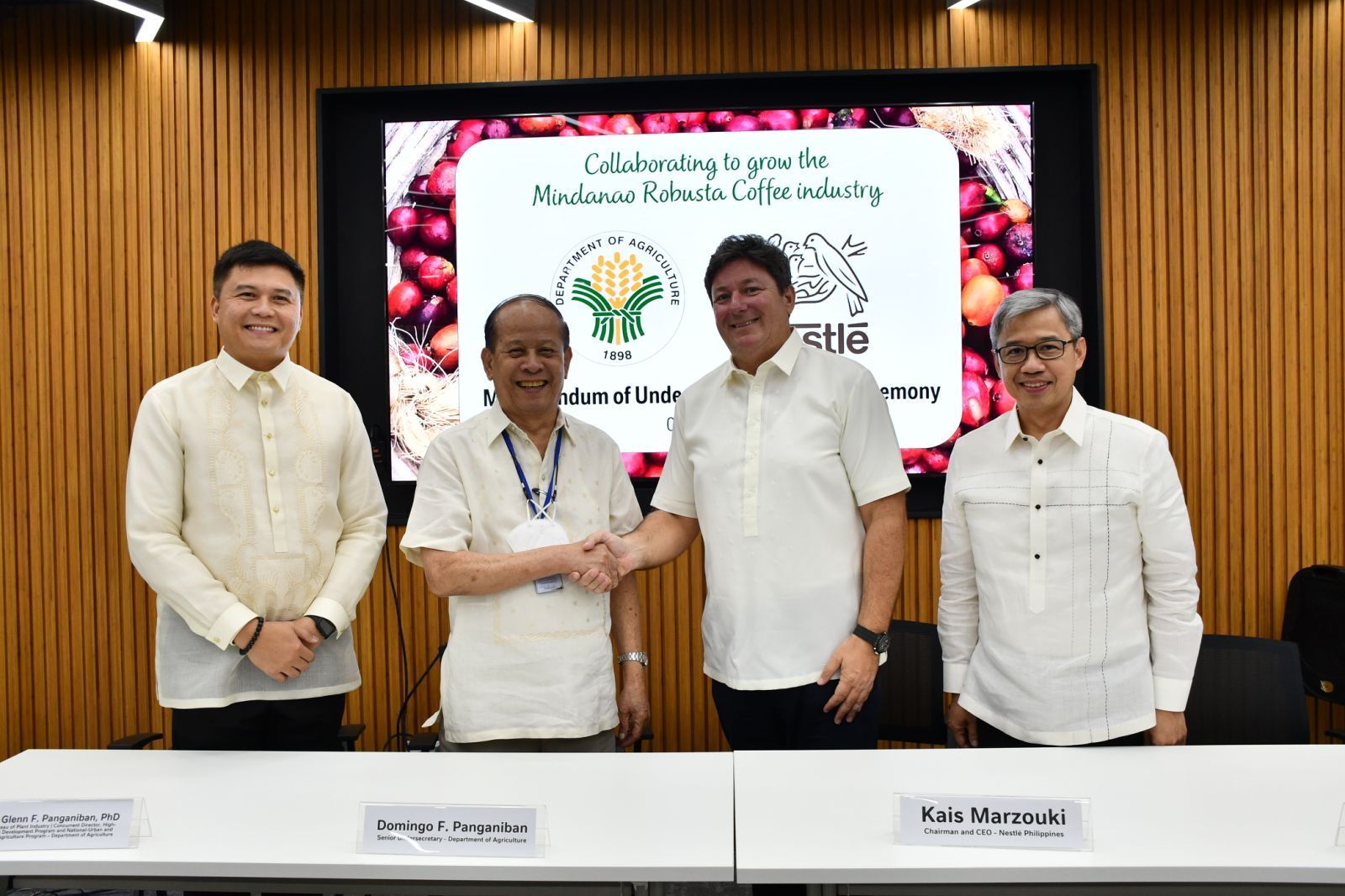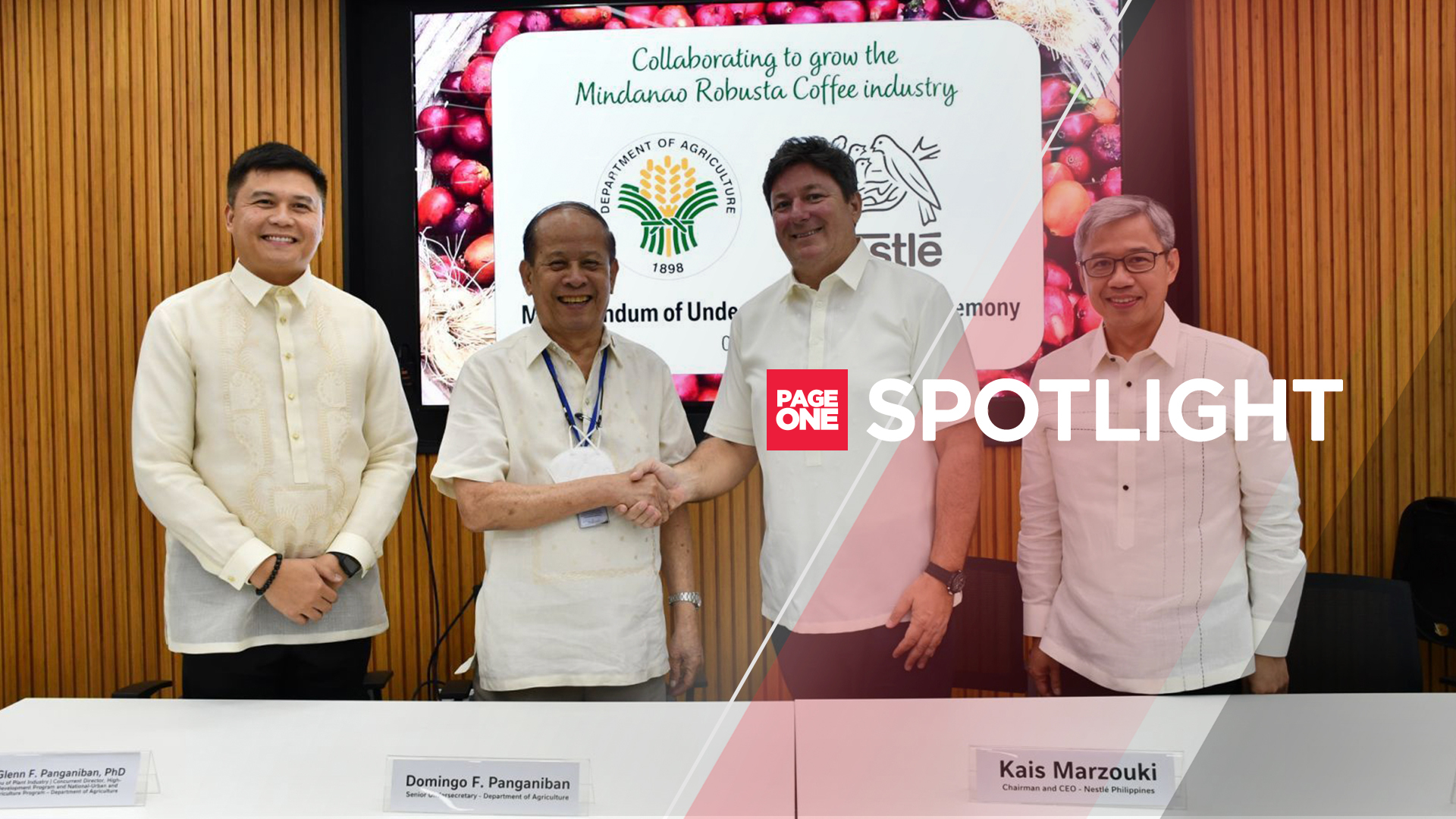The Department of Agriculture (DA) and Nestlé Philippines, today signed a Memorandum of Understanding (MOU) to jointly undertake The DA and Nestlé Mindanao Robusta Coffee Project, an initiative to grow the local coffee industry and to improve the sustainability of Robusta Coffee Farming in the Philippines.
“As one of the country’s top five high-value crops, coffee sits high on the national economic agenda and is one of the DA’s urgent priorities for development and support,” said DA Senior Undersecretary Domingo Panganiban. “The Mindanao Robusta Coffee Project is a public-private partnership that aims to create a more robust and globally competitive coffee industry through programs that will increase farmers’ volume production and improve the quality of their green coffee beans.”
Under the MOU, DA, and Nestlé Philippines aim to raise the production of Robusta coffee to 1000 kg/ha coffee yield by 2027, specifically in Mindanao where 80 percent of the country’s coffee is produced. The project has also taken into consideration the market relevance of Robusta. According to the Philippines Statistics Authority, it makes up over 60 percent of all variants grown in the country. It can be used for a wide variety of blends and is best suited for the production of soluble coffee.
The cooperation between DA and Nestlé Philippines will have five main components that impact every step of the coffee value chain. These include research; fertilizer support; upskilling of farmers; establishment of coffee centers; as well as logistics and marketing.
“Nestlé is looking forward to working even more closely with DA to enhance smallholder coffee farmers’ livelihoods and quality of life. Through training and technical assistance, we are equipping them with agro-enterprise skills that transform them into agripreneurs; and introducing regenerative agriculture practices to make them more resilient to climate change,” said Kais Marzouki, Chairman and CEO, Nestlé Philippines. “We are also looking for ways to innovate our buying process of green coffee beans to help increase our volume purchase of local coffee beans from farmers and cooperatives. The goal is to shift sourcing to 100 percent local coffee beans because NESCAFÉ is kapeng Pilipino para sa Pilipino.”
Research trials towards a regenerative agriculture model for fertilization
Smallholder farmers are the country’s main producers of coffee. Local production has not been able to meet the rising demand, particularly with coffee consumption increasing steadily while production has been on a decline. In 2015, farm yields averaged only 0.30 tons per hectare, and according to the Philippine Coffee Roadmap 2021-2027, coffee production dropped by 16.17 percent from 72,341 tons in 2015 to 60,640 tons in 2020.
To study how coffee farmers can optimize existing coffee hectarage, Nestlé Philippines and the University of Southern Mindanao will conduct a productivity assessment in several Robusta farms in Mindanao as one of the first joint actions under the DA-Nestlé partnership. Different rates and combinations of organic and inorganic fertilizers will be field tested to determine its impact on coffee growth and yield performance, as well as the incidence of pests and diseases. The study will also compute the cost-effectiveness of the different fertilizer treatments and will provide a model for a balanced fertilization for coffee growers as part of its conclusion.
Balanced fertilization is an important aspect of sustainable agriculture. It is one of the techniques applied in regenerative agriculture, a method of farming that enriches the soil’s nutrients rather than depleting it. Nestlé advocates for regenerative farming by training coffee farmers on practices such as agroforestry, cover crops, composting, and intercropping. Regenerative agriculture will improve farmers’ resiliency so continued training on these regeneration principles will be a critical component of the training initiatives to be done under the DA-Nestlé partnership.
Bringing to life the goals of the Philippine Coffee Roadmap
The Mindanao Robusta Coffee Project also helps realize the objectives of the Philippine Coffee Roadmap, which expects coffee growers to have improved self-sufficiency levels from 15 to 39 percent.
As international trade cooperations create a more competitive market landscape, public-private cooperation should take on a multi-stakeholder and value-chain approach to grow the coffee industry. Apart from improving yields and incomes of farmers, coffee quality should also be enhanced.
The DA-Nestlé partnership will ensure coffee meets market standards through the establishment of an integrated coffee center in Sultan Kudarat, the country’s top coffee producer which is positioning itself as the coffee capital of the Philippines. The center will serve as a shared facility for the development and distribution of good quality varieties of coffee plantlets, as well as a demo or training site, post-harvest facility, and buying station.
Nestlé is also reaffirming its commitment to be a ready market for locally-grown Robusta green coffee beans (GCB), which is the sole ingredient to manufacture NESCAFÉ, its leading soluble coffee brand. Nestlé buying stations are currently open in Valencia, Bukidnon, and Tacurong, Sultan Kudarat for suppliers to deliver their coffee.
With all these initiatives in the pipeline, DA and Nestlé hope to uplift the lives of coffee farmers and energize the coffee sector. The Mindanao Robusta Coffee Project is aligned with the High-Value Crops Development Program (HVCDP), one of the banner programs of the Department of Agriculture, in its vision to attain food self-sufficiency, economic growth, agricultural resiliency, and enhancement of consumer’s health and welfare.

DA and Nestle Philippines embark on 5-year partnership to grow the local coffee industry upon signing a Memorandum of Understanding to jointly undertake The Mindanao Robusta Coffee Project. Under the MOU, DA and Nestle will undertake joint actions to increase coffee yield to 1000kg/ha, make farmers more resilient and profitable through training on regenerative agriculture and agripreneurship. L-R: Glenn Panganiban, Director, Bureau of Plant Industry and Concurrent Director, High-Value Crops Development Program and National-Urban and Peri-Urban Agriculture Program – Department of Agriculture; Hon. Domingo F. Panganiban, Senior Undersecretary – Department of Agriculture; Kais Marzouki, Chairman and CEO – Nestle Philippines; and Joey Uy, Head of Corporate Affairs – Nestle Philippines.









